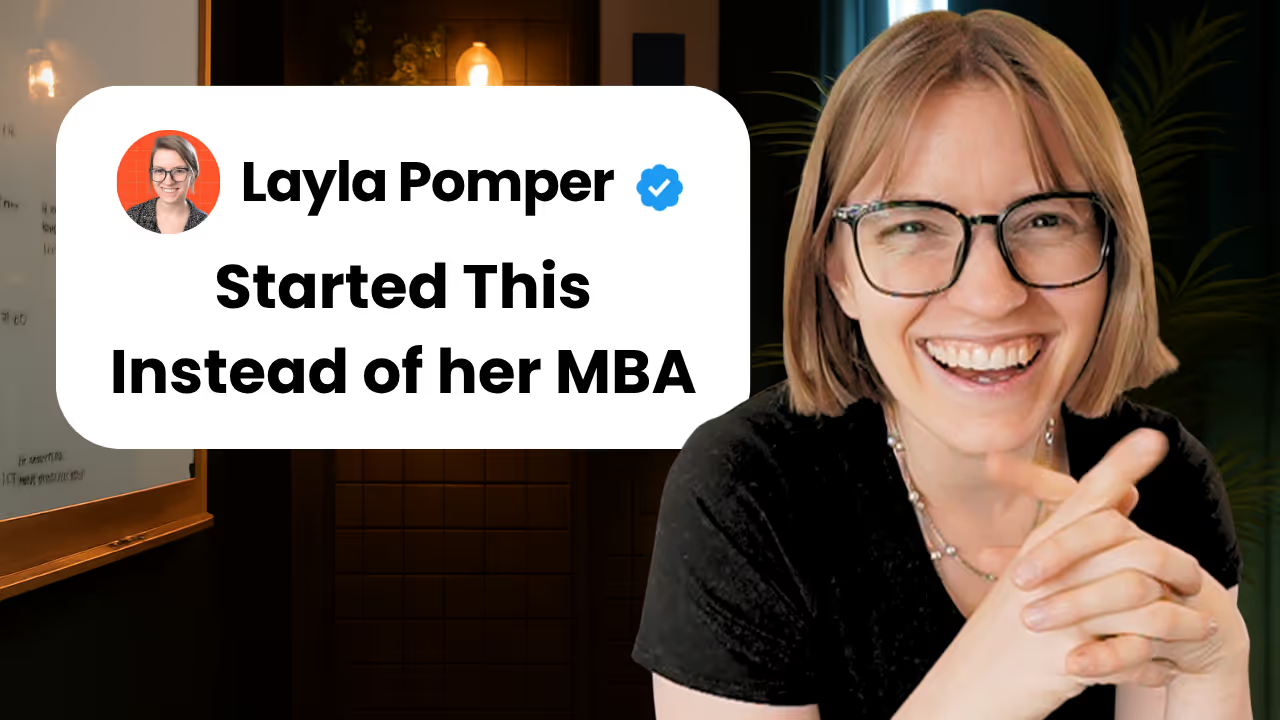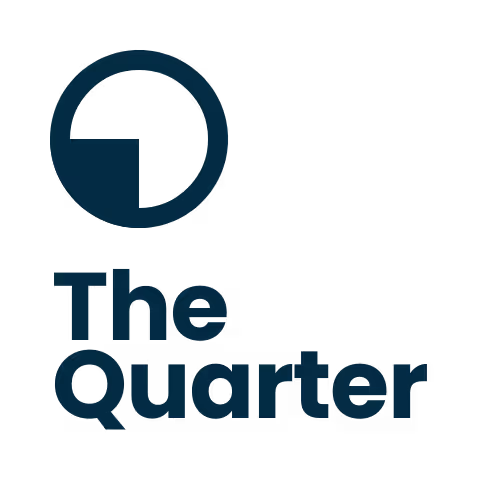She Got Paid for Her MBA Instead

"By saying it's my MBA business, I basically gave myself permission for the first three years to just focus on learning and getting paid anything to learn is great when you compare it to an MBA where you're paying to learn."
That's Layla Pomper, the founder of ProcessDriven, a company that helps small teams clean up their operations so they can turn their messy chaos into control.
Layla has bootstrapped ProcessDriven to over $250,000 in annual revenue and over 100,000 subscribers on YouTube. But here's the thing - ProcessDriven was never supposed to be like this.
It was supposed to be just a business that she would run for maybe two or three years. Well, seven years later, and Layla still hasn't applied for a new job.
In this deep dive, we'll explore the mindset that helped Layla grow ProcessDriven initially, the three different chapters or pivots of ProcessDriven, and how Layla has used YouTube to grow ProcessDriven to where it is today.
But before we dive into all of ProcessDriven, let me give you a little bit of context about what Layla was doing before she started her business.
The Story of ProcessDriven
When the Dream Job Becomes a Nightmare
In 2017, Layla landed what she thought was her dream job at a small FinTech firm. She was going to transition overseas, work internationally - everything she'd ever wanted was coming true at once.
And then she realized everything about that scenario sounded terrible.
As Layla put it, "I talked to my manager and they're like, 'Hey, don't worry, in three to five years you'll get into this position that'll have some interest.' And I basically listened to that performance review and realized I don't want to wait three to five years to enjoy what I spend the majority of my life doing."
So she quit. With no plan.
When Layla looked at the job market, she realized everything that was fun required three to five years of experience. So she decided to start something and get that experience herself.
"It's been seven years now. I'm still doing the same business that I started seven years ago. And I think what ended up happening is I fell in love with the process. I kept learning two years in, I was like, 'oh, I'm not done. I just learned this new thing that I don't know.' And then I went two more years and, 'oh, what about this?' The business became so much more of an education that any PhD could have or anything else."
The MBA Mindset That Changed Everything
Layla's approach was radically different from most entrepreneurs. Instead of treating her business as purely a way to replace her income, she treated it as her personal MBA program.
"By saying it's my MBA business, I basically gave myself permission for the first three years to just focus on learning and getting paid anything to learn is great when you compare it to an MBA where you're paying to learn."
This mindset shift was crucial. It allowed her to:
- Experiment freely without the pressure of immediate perfection
- Say yes to projects that would teach her new skills
- Build the right thing rather than just the profitable thing
- Run mini experiments without existential pressure
As Layla described her early days: "It was messy. I was the first time founder. I had like a little nest egg I'd saved from my job out of college and working through college and then I just had hustle. I didn't know anyone. I didn't have any durable skills. I did so many things wrong, but it still worked."
Her goal was simple: get two to three years of experience. It didn't matter what she did, as long as she was learning from it.
She entered the marketplace as what she calls "a very overqualified virtual assistant." Her first gigs were bookkeeping work, organizing files, setting up software like Dubsado - the kinds of projects that barely paid anything but taught her valuable business fundamentals.
Her first clients came from those networking events that, as she puts it, she's "so glad to move past now."
By year three of this approach, Layla had over $200,000 in annual revenue. Not bad for an overqualified virtual assistant.
The Three Chapters of ProcessDriven
If you look at ProcessDriven today and try to find that overqualified virtual assistant, you'll notice something completely different. Layla has made some pretty significant pivots over the years.
Chapter 1: The Overqualified Virtual Assistant (2018-2019) This was Layla doing "whatever you needed" when it came to operations and administrative work. She was learning the fundamentals of running a business while getting paid to do it.
Chapter 2: The ClickUp and Smart Suite Specialist (2019-2024) Layla realized that software setup was something people were really searching for and was really easy for her. She discovered a tool called ClickUp that had just been founded around the same time as her business.
"I realized, oh, well, if I specialize in a few tools, my setup goes a lot faster, I can be really good at it. And I can start making content about it and start marketing in a different way."
ClickUp was the perfect Blue Ocean opportunity. As Layla put it: "They came of age just when I did. They're about the same age as my business. They had no real good content online about them, and there was demand. I could tell that it was a really good product and they were shitty at explaining what it does."
Eventually, she added SmartSuite to the mix because it served a more data focused subset of users that ClickUp couldn't handle well.
Chapter 3: The Framework-First Approach (2024-Present) In 2024, Layla moved beyond focusing on specific software and started leading with ProcessDriven's framework. Now they translate their approach into multiple tools including Notion, ClickUp, SmartSuite, and Monday. The focus shifted from any particular software feature to how they structure and set up operations systems.
The Blue Ocean Strategy
Throughout this evolution, Layla has consistently applied Blue Ocean Strategy finding spaces that aren't very competitive rather than fighting in crowded markets.
"I like Blue Oceans. I don't like creating in crowded spaces. You'll never see me do a Notion tutorial."
For ClickUp, it was a complete risk. As Layla put it, "I just loved the product. I had been looking at this space for a while and I was like, this product's so good. I think they're gonna win." It wasn't necessarily a good choice for most people to make such big bets, but it worked out for her.
But for SmartSuite, she was in a much different position. "Off the top of my head, I would say we probably had 60,000 YouTube subscribers, probably had 1500 clients or so that had gone through our program. Like I had a lot of market data at that point of what people were looking for. I had worked with so many ClickUp users who were trying to MacGyver it into being a database tool. Like I had the short list of at least 20 people I know would need or would want, prefer an alternative."
For bootstrapped companies, living in Blue Oceans is often the best case scenario. There's no market scarcity, and you're not competing against well-funded competitors with more resources. You can focus on providing value to your customers without worrying about grabbing market share from larger players.
Growth Strategies of ProcessDriven
Layla has grown ProcessDriven from zero to over $250,000 in annual revenue using essentially two main growth strategies across all three chapters of her business.
1. Relationships
This strategy built the entire first chapter of ProcessDriven. Layla went to every single networking event she could find. She used SCORE, the mentoring program funded through the US Federal government. By going to these networking events and asking for referrals from her clients, this led to Layla having over $200,000 in annual revenue by year three.
This approach is similar to other successful local entrepreneurs like Kylen Blom of Silkscreen Marketing. It takes time to build that network, but eventually you have a really strong foundation that gives you a nice income base.
As Layla learned, you can build a pretty solid business just through local networking events, even in smaller cities. You don't need to be in New York or LA to make this work.
2. YouTube (Social Media)
This strategy has fueled chapters two and three of ProcessDriven. Starting in 2019, Layla began creating YouTube content videos based solely on ClickUp. Eventually, she added SmartSuite content, and now her content focuses more on operational framework content.
What Layla discovered is that you can build a really great business by being focused on just one specific tool on YouTube. While it can take time for videos to get going, the search driven nature of tool focused content can be incredibly powerful.
Many of Layla's videos on ClickUp and SmartSuite have hundreds of thousands of views. Based on the tool focused nature of her content, YouTube search is likely driving a significant portion of those views. People searching "how to use ClickUp" or "ClickUp tutorials" find her content and often become clients.
This approach works particularly well because: • Tool focused content has strong search demand • Once you establish expertise in one tool, you can slowly expand • The education based content builds trust with potential clients • Search traffic provides consistent, long term growth
Layla has grown this approach systematically. She started really focused on ClickUp, then slowly began experimenting with SmartSuite while maintaining her ClickUp foundation. Once SmartSuite became part of her core offering, she started experimenting with broader operations content.
If you can build your foundation from really small and then grow with that, it's a really effective way to build a YouTube channel and develop a significant audience.
Today, Layla has over 100,000 subscribers on YouTube, and that foundation has been crucial to ProcessDriven's growth beyond $250,000 in annual revenue.
If you want to learn more about ProcessDriven, you can check out Layla on YouTube or visit her website at processdriven.co.

